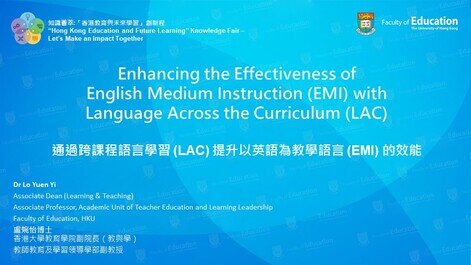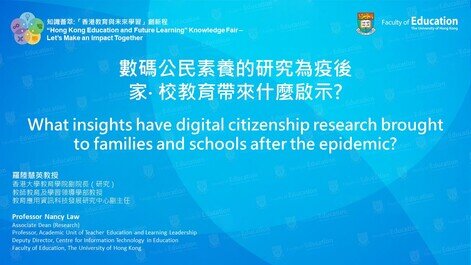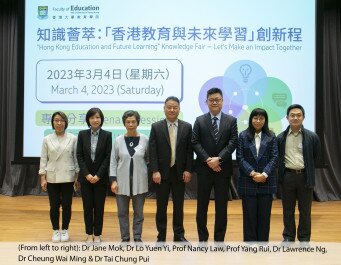Press Release: HKU Faculty of Education organises “Hong Kong Education and Future Learning” Knowledge Fair – Let’s Make an Impact Together to share research implications
新聞稿:香港大學教育學院舉辦知識薈萃:「香港教育與未來學習」創新程
Updated on March 04, 2023 (Sat)
HKU Faculty of Education organises “Hong Kong Education and Future Learning”
Knowledge Fair – Let’s Make an Impact Together to share research implication
“Hong Kong Education and Future Learning” Knowledge Fair – Let’s Make an Impact Together, organised by The Faculty of Education of The University of Hong Kong (HKU), was held today (March 4). The event aimed to share the Faculty teachers’ research outcomes with the school sector and stakeholders to plan for future learning together.
The event started with the opening remarks made by Professor Yang Rui, Dean of the Faculty. He reiterated that a globally-acclaimed faculty of education also needs to be locally committed. “While great significance is attached to local engagement, we, as an integral Faculty of HKU, will never weasel out of our social obligations. We hope to be a vital nexus between global theory and local practice, aiming at both theoretical breakthroughs and practical significance, as demonstrated by today’s activities. Believing that teachers and principals are also researchers and policymakers, we are keen to work closely with local schools to make a difference,” said Professor Yang.
Plenary sessions and some interactive workshops were conducted in the whole-day event, featuring four themes including English and Chinese language learning (as 1st and 2nd language), organisational learning for innovation, and digital literacy. In the morning plenary sessions, teachers from the Faculty shared the theoretical bases and key findings of educational research that have significant implications for student learning and well-being, school development, parenting practices and parental education, and policy implementation and evaluation. The respondents in each session provided additional insights into the themes based on their work and personal experiences.
The plenary sessions started with Dr Lo Yuen Yi, Associate Dean (Learning & Teaching), and Associate Professor, Academic Unit of Teacher Education and Learning Leadership (TELL), Faculty of Education, HKU on the theme of “Enhancing the Effectiveness of English Medium Instruction (EMI) with Language Across the Curriculum (LAC)”.
Dr Lo pointed out that the medium of instruction (MOI) used to teach and learn content subjects is not only a long-lasting debate in Hong Kong, but also in other contexts like Europe and the Asia-Pacific region. However, students often encounter difficulty when mastering content knowledge and English simultaneously. As HKU researchers have been conducting school-based empirical studies on how to support teachers and students when using English as the MOI, Dr Lo shared their findings regarding LAC, which can be manifested through teachers’ cross-curricular collaboration and content and language integrated pedagogy. She also introduced different cross-curricular collaboration models, a pedagogical framework, and strategies to facilitate teachers’ professional development and pedagogy to effectively scaffold student learning. Some key findings are as follows:
- To enhance the effectiveness of teaching and learning in EMI, LAC could be implemented through cross-curricular collaboration and content and language integrated pedagogy;
- Cross-curricular collaboration could be manifested in three complementary dimensions: formal collaboration, informal collaboration and co-curricular activities; and
- EMI teachers’ professional development could be promoted with a holistic model of intensive workshops, on-site school support, school-based LAC and a professional learning community.
After Dr Lo’s talk on MOI, two Faculty teachers, Dr Cheung Wai Ming, Unit Head, Academic Unit of Social Contexts and Policies of Education (SCAPE), and Director, Centre for Advancement of Chinese Language Education and Research (CACLER), and Dr Tai Chung Pui, Assistant Professor, Academic Unit of SCAPE, and Member of Management Committee, CACLER, continued with a language-learning related session entitled “Culturally Responsive Strategies to Enhance Chinese Language Learning (as 1st and 2nd language)”.
Dr Cheung and Dr Tai shared their research findings about Hong Kong teachers’ culturally responsive teaching self-efficacy. Among the five domains, “efficacy to accommodate diversity” is the most important. In order to enhance it, Dr Cheung and Dr Tai introduced the culturally responsive teaching strategies developed with collaborating schools over the years, which enabled students to spread their wings and soar in their Chinese learning. Some key findings are as follows:
- Teachers performed the weakest in their “efficacy to be aware of cultural differences”; and
- Teachers performed the strongest in their “efficacy to create a positive and trusting relationship with multicultural students”.
In addition to biliteracy and trilingualism, organisational learning was also a hot topic covered in the plenary sessions. Dr Jane Mok, Assistant Director, Centre for Information Technology in Education (CITE) of the Faculty, gave a talk on the theme ‘How to Design Appropriate “Architecture for Learning” to Promote Organisational Learning to Scale Education Innovations?’.
Dr Mok presented that CITE has been supporting local secondary and primary schools to implement different educational innovations, by walking with them during the change process and witnessing their development trajectories. Dr Mok’s research team found that a multilevel leadership team comprising teachers, middle managers and school administrators, and learning conditions created to facilitate innovation-focused learning at multiple levels are crucial to the sustainability and scalability of the innovations. Dr Mok also shared the principles for designing organisational learning and the implications of this multilevel connected learning model for the future development of Hong Kong education. The key findings of Dr Mok’s research are as follows:
- Having a multilevel leadership team, e.g. comprising teachers, middle managers and school administrators, is crucial to the sustainability and scalability of educational innovations;
- Learning conditions need to be created to facilitate innovation-focused learning at multiple levels, to enhance the innovation teams’ professional capacity when implementing changes; and
- Important considerations for the design of the innovation-focused organisational learning, i.e. “Architecture for Learning”, include the organisational structure, interaction mechanism, agency of the multilevel innovation team and effective feedback and communication channels.
As information literary and e-learning are essential topics in education, Professor Nancy Law, Associate Dean (Research), Professor, Academic Unit of TELL, and Deputy Director, CITE of the Faculty, discussed on the theme of “What Insights Have Digital Citizenship and Digital Literacy Research Brought to Post-Pandemic School and Family Education?” in the last plenary session.
Professor Law stated that HKU researchers conducted four cycles of research on the digital competence of primary and secondary school students in Hong Kong from 2019 to 2022 and the factors affecting them. The following key findings are shared:
- The research revealed serious and increasing digital competence divides within and across schools over time;
- Digital competence contributes positively to online learning and protects against online risks, such as Internet addiction and cyberbullying experiences. New modes of social interactions and transactions, such as blockchain and metaverse, and rapid developments in artificial intelligence and big data (as found in powerful applications such as ChatGPT) bring new demands on the digital competence of citizens; and
- Home resources, digital parenting, school culture, and e-learning leadership are significant factors in influencing digital citizenship development.
Based on their findings, Professor Law discussed what families, schools, policymakers, and the concerned public could do to address these widening divides.
Following the plenary sessions, participants enthusiastically responded to the presentations and raised questions to the speakers in the panel discussion moderated by Dr Lawrence Ng, Associate Dean (Outreach and Engagement) of the Faculty.
Mr Wong Kwan Ho, Prefect of Studies and Head of LAC at TWGHs Mrs Wu York Yu Memorial College, echoed the effectiveness of LAC in promoting teachers’ professional development and student learning. He shared the development of the school’s LAC practices, with reference to the HKU research team’s findings and frameworks.
Ms Wong Fai Mei, Principal of Baptist Lui Ming Choi Primary School, expressed that culturally responsive strategies are a mirror for teachers to reflect on how to utilise Chinese culture and multinational cultures as learning materials. Teachers should also make good use of community resources for better cultural understanding so as to make learning Chinese a win-win situation.
Mr Tsang Chi Cheong, Principal of Jordan Valley St. Joseph’s Catholic Primary School, shared his experience of applying the multilevel connected learning model in different schools, stressing that engaging the innovation team in inquiry and making their learning visible are crucial to the success of the education innovation.
Sr Anita Kwok Ming Yin, Principal of Daughters of Mary Help of Christians Siu Ming Catholic Secondary School, commented that the longitudinal data has helped inform developing a five-year school development plan embracing blended learning and positive education.
While the Faculty of Education would continue to reach out to stakeholders, the speakers expressed that schools, school councils, school-sponsoring bodies, professional associations, parent associations, non-government organisations and government departments are most welcome to contact them regarding continuous professional development opportunities that could meet their needs, future collaboration in research and publication, as well as continuous dialogue with them so that they could all make an impact on student learning and quality education.
In addition to the Plenary Sessions, five practical workshops are to be conducted in the afternoon. Details are as follows:
Framework and Strategies for Planning LAC
Speaker: Dr Lo Yuen Yi, Associate Dean (Learning & Teaching), and Associate Professor, Academic Unit of TELL, Faculty of Education, HKU
Teaching Mathematics Through the Medium of English
Speaker: Dr Arthur Lee, Lecturer, Academic Unit of TELL, Faculty of Education, HKU
Co-creations as a Blessing in Uncertain Times – The Magic of Picture Book
Speakers:
Dr Cheung Wai Ming, Unit Head, Academic Unit of SCAPE, and Director, CACLER, Faculty of Education, HKU
Ms Elaine Wong, Project Manager, CACLER, Faculty of Education, HKU
Dr Stephanie Chan, Assistant Professor, Academic Unit of CDIS, Faculty of Education, HKU
How to Design Appropriate “Architecture for Learning” to Promote Organisational Learning to Scale Education Innovations?
Speakers:
Dr Jane Mok, Assistant Director, CITE, Faculty of Education, HKU
Ms Cheng Cheuk Sze, Vice Principal, SKH Yuen Chen Maun Chen Jubilee Primary School
Ms Fung Yuen Mee, Assistant Principal, North Point Methodist Primary School
How to Use Data in Digital Schools and Digital Literacy to Enhance Student Learning in Primary/Secondary Schools?
Speakers:
Professor Nancy Law, Associate Dean (Research), Professor, Academic Unit of TELL, and Deputy Director, CITE, Faculty of Education, HKU
Ms Law Siu Tung, Curriculum Leader, Shanghai Alumni Primary School
Mr Ho Ying Hon, Principal, Caritas Fanling Chan Chun Ha Secondary School
Sr Anita Kwok Ming Ying, Principal, Daughters of Mary Help of Christians Siu Ming Catholic Secondary School
To view the e-version of this press release, download related photos and presentation files, please visit, please visit http://web.edu.hku.hk/press.
For media enquiries, please contact Ms Emily Cheung, Senior Manager (Development and Communications), Faculty of Education, HKU (Tel: 3917 4270 / Email: emchy@hku.hk).
March 4, 2023
香港大學教育學院舉辦知識薈萃:「香港教育與未來學習」創新程
香港大學(港大)教育學院今天(3月4日)舉行知識薈萃:「香港教育與未來學習」創新程。該活動旨在與學校和社會持份者分享學院老師的研究成果,共同規劃未來學習。
活動由學院院長楊銳教授的致辭揭開序幕。楊教授重申即使一所享譽全球的教育學院,也需要對本地教育有所承擔。楊教授說:「地方參與非常重要,港大教育學院作為港大密不可分的重要成員,我們樂於履行社會責任。我們希望成為國際理論和本地實踐之間的重要橋樑。正如今天的活動,我們不但旨在突破理論,亦著重實踐。我深信教師和校長也是研究人員和政策制定者,我們熱切期待與本地學校密切合作,攜手作出貢獻和改變。」
全日活動包括多個專題分享和專題工作坊,四個主題涵蓋中文及英文作為第一和第二語言學習、組織學習架構以促進創新,以及數碼素養。學院老師於早上的專題分享討論多項教育研究的理論基礎和主要成果,就學生學習及身心健康、學校發展、育兒方法、親子教育,以及政策實施與評估作出意義深長的啟迪。嘉賓根據他們的工作經歷和個人經歷就每個專題提供更多見解。
首個專題分享由港大教育學院副院長(教與學)及教師教育及學習領導學部副教授盧婉怡博士主講,主題為「通過跨課程語言學習(LAC)提升以英語為教學語言(EMI)的效能」。
盧博士指出在這個全球化時代,教學語言政策在香港以至歐洲和亞太地區等,均引起不少爭論。然而當學生以英語作為教學語言時,往往難於同時掌握學科內容和英語。港大的研究團隊一直致力研究如何支援以英語作為教學語言的教師和學生,盧博士分享關於跨課程語言學習的研究成果,提出跨課程語言學習可以通過教師的跨課程協作以及內容和語言融合教學法來體現,並介紹不同的跨課程協作模式和教學策略,以促進教師的專業發展和教學法,從而有效地支持學生的學習。研究發現:
- 通過教師的跨課程協作以及內容和語言融合教學法,可提升以英語為教學語言的教學效果;
- 跨課程協作可體現於三個互補的方面:正式協作、非正式協作和聯課活動;及
- 密集式工作坊、在校支援、校本跨課程語言學習及專業學習社群的整體模型可促進以英語為教學語言的教師的專業發展。
其後教育政策與社會學部副教授及學部部長及中文教育研究中心總監張慧明博士,與學部助理教授及中心管理委員會成員戴忠沛博士兩位學院老師,繼續分享有關語言學習的主題:「以文化適切的策略提升中文作為第一和第二語言學習的效能」。
張博士和戴博士分享香港教師在文化適切自我效能方面的五個範疇,其中以「因應多元需要而調整教學」最為重要。為提升教師文化教學適切自我效能,張博士和戴博士介紹多年來與協作學校發展的文化適切高效能教學策略,協助學生在中文學習上展翅高飛。研究發現:
- 教師的關注文化差異自我效能最弱;及
- 教師與多元文化學生建立正面和信任關係的自我效能最強。
除了兩文三語外,組織學習架構也是專題分享中的一個重要主題。學院的教育應用資訊科技發展研究中心助理總監莫鳳儀博士就此分享了「如何設計合適的『組織學習架構』以促進校內、外教育創新?」。
莫博士指出教育應用資訊科技發展研究中心一直支持本地中小學推行不同的教育創新,在變革過程中一直與學校同行,見證其發展軌跡。莫博士的團隊發現由教師、中層管理人員和學校管理層組成的多層級領導團隊,以及為促進以創新為本的多層級學習而締造的學習條件,對於教育創新的可持續性和可擴展性至關重要。莫博士更分享組織學習的設計原則,以及這個連繫多層級的學習模式對香港教育未來發展的影響。莫博士的研究發現:
- 多層級領導團隊(例如由教師、中層管理人員和學校管理層所組成)對於教育創新的可持續性和可擴展性至關重要;
- 需締造促進以創新為本的多層級學習條件,以提升創新團隊實踐變革的專業能力;及
- 設計以創新為本的組織學習(即「組織學習架構」)的重要考慮因素包括組織架構、互動機制、多層級創新團隊的自主性、有效的溝通及回饋渠道等。
鑒於資訊素養與電子學習是教育領域的重要課題,學院副院長(研究)、教師教育及學習領導學部教授及教育應用資訊科技發展研究中心副主任羅陸慧英教授在最後一個專題分享「數碼公民素養的研究為疫後家‧校教育帶來什麼啟示?」進行分享和討論。
羅教授指出港大研究團隊於2019年至2022年對香港中小學生的數碼公民素養及其影響因素進行了四個週期的研究,並分享以下研究結果:
- 隨著時間推移,學校内部和學校之間出現嚴重且不斷擴大的數碼素養鴻溝;
- 數碼素養不但對網上學習有積極貢獻,並且是抵禦網絡成癮和網絡欺凌等網上風險的保護因素。區塊鏈、元宇宙等新的社交和交易模式,以及人工智能和大數據(如ChatGPT等強大應用程式)的快速發展,對公民的數碼能力提出了新的要求;及
- 家庭資源、數碼育兒、學校文化和電子學習領導力是影響數碼公民發展的重要因素。
羅教授就研究結果討論家庭、學校、政策制定者和相關公眾如何應對不斷擴大的鴻溝。
專題分享結束後,學院副院長(拓展與協作)吳民華博士主持小組討論,參加者踴躍回應及向講者提問。
東華三院伍若瑜夫人紀念中學教務主任及跨科英語學習統籌王君浩老師贊同跨課程語言學習在促進教師專業發展和學生學習方面的成效,並分享其學校參考港大研究結果和框架實踐和發展跨課程語言學習的情況。
浸信會呂明才小學黃輝微校長認為「文化適切策略」是一面鏡,讓教師反思運用中國文化及多國文化作為學習材料,並應善用社會資源學習彼此的文化,令中文學習的效能更相得益彰。
佐敦谷聖若瑟天主教小學曾智昌校長分享了他在不同學校應用多層級連繫學習模式的經驗。曾校長強調,讓創新團隊參與以創新為中心的探究, 並讓他們的學習可看得見,是教育創新成功的關鍵。
天主教母佑會蕭明中學校長郭明英修女指出,縱向數據為制定包含混合式學習和正向教育的五年學校發展計劃時提供重要信息。
教育學院日後繼續與持份者接觸,眾講者亦表示歡迎所有學校、學校校董會/議會、辦學團體、專業團體、家長團體、非政府組織和政府部門與他們聯繫,就持續專業發展機會的需要,未來研究和出版方面的合作,與他們保持良好溝通,共同合力對學生的學習和優質教育作出貢獻及影響。
五個專題工作坊緊接專題分享於同日下午舉行。詳情如下:
規劃跨課程語言學習 (LAC) 的架構和策略
講者:香港大學教育學院副院長(教與學)及教師教育及學習領導學部副教授盧婉怡博士
以英語教授數學
講者:香港大學教育學院教師教育及學習領導學部講師李文生博士
疫下共創祝福 ─ 繪本的魔法
講者:
香港大學教育學院教育政策與社會學部副教授及學部部長及中文教育研究中心總監張慧明博士
香港大學教育學院中文教育研究中心項目經理黃綺玲女士
香港大學教育學院溝通、發展與資訊科學學部助理教授陳穎欣博士
如何設計合適的「組織學習架構」以促進校內、外教育創新?
講者:
香港大學教育學院教育應用資訊科技發展研究中心助理總監莫鳳儀博士
聖公會阮鄭夢芹銀禧小學副校長鄭焯施女士
北角衞理小學助理校長馮婉湄女士
如何使用數碼學校和數碼素養數據加强中、小學學生學習?
講者:
香港大學教育學院副院長(研究)、教師教育及學習領導學部教授及教育應用資訊科技發展研究中心副主任羅陸慧英教授
滬江小學課程主任羅筱彤女士
明愛粉嶺陳震夏中學校長何應翰先生
天主教母佑會蕭明中學校長郭明英修女
請登入http://web.edu.hku.hk/press以瀏覽網上版新聞稿,以及下載相關相片和簡報等參考資料。
傳媒查詢,請聯絡香港大學教育學院高級經理張可恩女士(電話:3917 4270 / 電郵︰[javascript protected email address])。
2023年3月4日
















